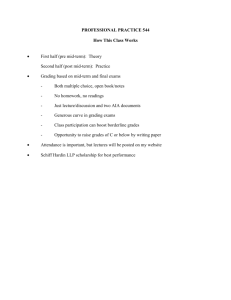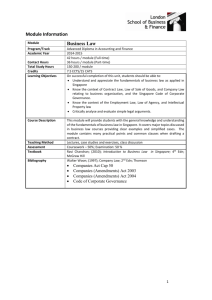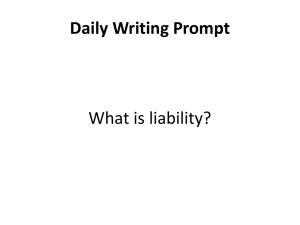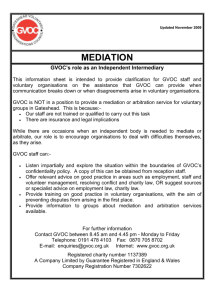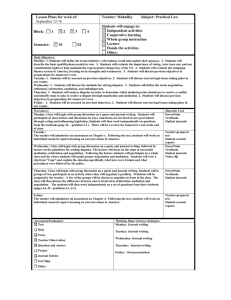File
advertisement
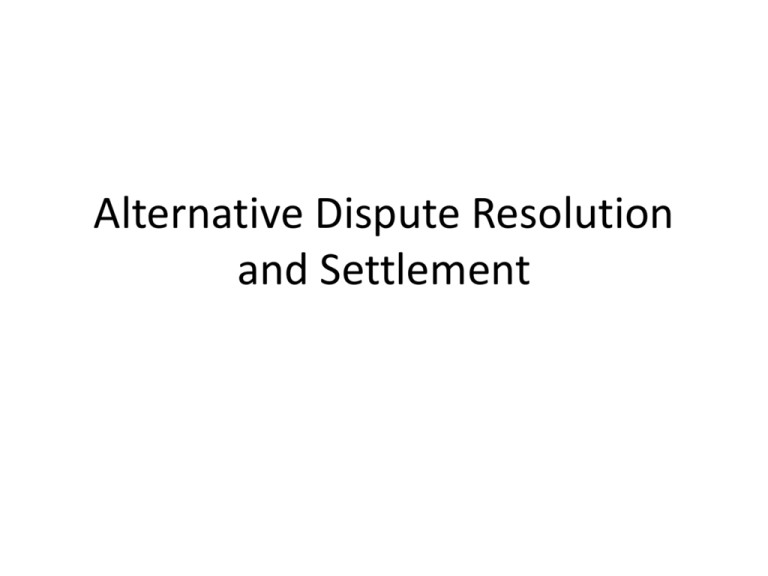
Alternative Dispute Resolution and Settlement Litigation costs • Median time-to-trial in patent suits from 1995 to 2015 averaged well over two years (PwC, 2015). • For firms battling over intellectual property (IP), it is a time-consuming, expensive, and seemingly unpredictable process. • Also, you are never quite sure what the jury might award. Facts • By some estimates, 97 percent of civil cases are settled. • Among those cases that are settled, large percentages are resolved through courtordered arbitration. • Other times, because of an arbitration clause, a conflict is resolved without ever filing suit. Outline • Arbitration • Mediation • Settlement Arbitration • Arbitration is a process in which a third-party neutral arbitrator, or a panel of arbitrators, decides outcome of a dispute. • The arbitral award is usually final. • Arbitration can be selected before or after the dispute. • Parties can select their own rules or use procedural rules from an international board like the American Arbitration Association or the International Chamber of Commerce. Example of Arbitrator in Korea • Benjamin Hughes, SNU Associate Professor • Professor Hughes has extensive experience as counsel in international arbitrations around the world and under most major arbitration rules. He practiced international arbitration at a large US firm (in the US and Singapore), and was the founding co-chair of the international dispute resolution practice group at one of Korea's oldest and largest full service law firms. • Professor Hughes ceased practice as a lawyer and has practiced only as an arbitrator and mediator since March 2013. Since then, he has been appointed as the sole, chair or co-arbitrator in arbitrations under rules of the ICC, AAA/ICDR, SIAC, HKIAC, UNCITRAL (administered and ad-hoc), KLRCA, JCAA, CIETAC, ACICA and KCAB, as well as purely ad-hoc arbitrations. He has also been appointed in both emergency and expedited proceedings. • Professor Hughes is a Fellow of the Chartered Institute of Arbitrators, the Singapore Institute of Arbitrators, the Hong Kong Institute of Arbitrators and the Australian Centre for International Commercial Arbitration. He also serves as an Executive Committee Member of the Seoul International Dispute Resolution Center and as a Member of the International Arbitration Committee of the KCAB, and was the founding chair of the Korea Chapter of the Chartered Institute of Arbitrators. How much do arbitrators make? • Federal Arbitration Act • This act provides for arbitration in federal courts and the state courts through the commerce act. • The Federal Arbitration Act provides for contractuallybased compulsory and binding arbitration, resulting in an arbitration award entered by an arbitrator or arbitration panel as opposed to a judgment entered by a court of law. In an arbitration the parties give up the right to an appeal on substantive grounds to a court. • The Federal Arbitration Act requires that where the parties have agreed to arbitrate, they must do so in lieu of going to court. FAA • Once an award is entered by an arbitrator or arbitration panel, it must be "confirmed" in a court of law. Once confirmed, the award is then reduced to an enforceable judgment, which may be enforced by the winning party in court, like any other judgment. Bowen v. Amoco Pipeline Company • FACTS: The parties agreed that they would have the right to appeal any arbitration award to the district court within thirty days “on the grounds that the award is not supported by the evidence.” Bowen v. Amoco Pipeline Company • Issue: Can their clause expand the judicial review of arbitrator’s judgment by district courts? • Conclusion: 10th Circuit said the intent behind the FAA as well as Supreme Court cases do not support a rule allowing parties to alter the judicial process by private contract. • Which means the parties will just have to accept the arbitrator’s decision. Bowen v. Amoco Pipeline Company • Analysis: “By agreeing to arbitrate, a party trades the procedures and opportunity for review of the courtroom for the simplicity, informality, and expedition of arbitration.” • Courts will only vacate an arbitration award only in limited circumstances or in accordance with a few judicially created exceptions. Bowen v. Amoco Pipeline Company • Vacation of arbitrator’s award is proper in: cases of fraud, corruption, arbitrator misconduct. • Court found that the agreement to challenge award “on the grounds that the award is not supported by the evidence” would undermine the policies behind the FAA. • Lesson: Arbitration is a very powerful form of dispute resolution. Arbitration • Arbitration is treated as a creature of contract. • Courts will enforce arbitration clauses absent fraud or duress and even if there is an imbalance of power between the parties or even in adhesion contracts. • Hence, large firms and credit card firms and car sales often times include arbitration clauses. Why? Anything wrong here? Mediation • Mediation is best described as “facilitated negotiation.” • Mediator has no power to resolve the dispute for the parties. • Instead parties attempt to reach their own agreement with the assistance of the mediator. Mediation Process • Mediator starts with an explanation of the process. • Then each party presents their viewpoint. • Then joint session moderated by mediator. • Then mediator may break up the groups for private discussions called caucus meetings. • If agreement is reached, a MOU is signed. • If no MOU, then arbitration or litigation could ensue. Benefits of Mediation • Unlike In Re MSTG, mediation negotiations are usually privileged under discovery, trial, etc. by state laws. • Parties are encouraged to speak freely and without fear so that an agreement can be reached. Why a Mediator? • • • • Speed up negotiations Reduce likelihood of miscalculation Help the parties reach a sounder agreement He can do this by holding separate confidential meetings with both parties and armed with that information but without disclosing the details, help shape the negotiations toward a common goal. Role of Mediator • He must know the desires, aspirations, working procedures, and business constraints of the parties. • He must be be a good translator by expressing each parties needs in a respectful and faithful way. • He can be the agent of reality and tell the parties bad news. • Lastly, he / she can be the scapegoat. Mediation Video • https://www.youtube.com/watch?v=9Oji5dxQ emQ In Re Atlantic Pipe Corporation • Facts: Plaintiff was suing Defendant over a busted oil pipe in Puerto Rico. Defendants filed counter claims and 3rd party compaints to various parties. The district court ordered mediation for all of the parties. • Issue: May a court order a non-consenting party to participate in mediation without any authority based in statute or rule? In Re Atlantic Pipe Corporation • Rule: There are 4 ways in which courts can order mandatory non-binding mediation: 1. Applying court’s local rules 2. An applicable statute – The ADR Act 3. FRCP 16 4. Court’s inherent powers In Re Atlantic Pipe Corporation • FRCP 16 – “The court may take appropriate action with respect to settlement and the use of special procedures to assist in resolving the dispute when authorized by statue or local rule” In Re Atlantic Pipe Corporation • Inherent Powers – FRCP 83 “Judges may regulate practice in any manner consistent with federal law and applicable rules” • Limitations to inherent powers: 1. Inherent powers must be used to enhance judicial process 2. Inherent powers cannot contradict applicable statute or rule 3. Inherent powers must be procedurally fair 4. Inherent powers must be exercised with restraint and discression In Re Atlantic Pipe Corporation • Analysis: In this case, the order requiring APC to attend mediation was within the district court’s inherent powers. The complexity of the instant case makes mediation a potentially beneficial process that has the possibility of clarifying the issues that exist amongst the parties. Directions to District Court • However, the district court’s mediation order lacked certain procedural safeguards that are required for such orders. In particular, the district court must set time or cost limitations to the mediation in order to avoid the time and cost demands of the mediation process from overwhelming the litigation. Directions to District Court • The district court should also make clear in its order that participation in mediation does not waive any litigation position that a party may hold. Therefore, the district court’s order is vacated and remanded. • So yes, mediation is allowed to be ordered by judge as long as it is procedurally fair. Case Settlement FRCP 68 • • • • (a) Making an Offer; Judgment on an Accepted Offer. At least 14 days before the date set for trial, a party defending against a claim may serve on an opposing party an offer to allow judgment on specified terms, with the costs then accrued. If, within 14 days after being served, the opposing party serves written notice accepting the offer, either party may then file the offer and notice of acceptance, plus proof of service. The clerk must then enter judgment. (b) Unaccepted Offer. An unaccepted offer is considered withdrawn, but it does not preclude a later offer. Evidence of an unaccepted offer is not admissible except in a proceeding to determine costs. (c) Offer After Liability is Determined. When one party's liability to another has been determined but the extent of liability remains to be determined by further proceedings, the party held liable may make an offer of judgment. It must be served within a reasonable time—but at least 14 days—before the date set for a hearing to determine the extent of liability. (d) Paying Costs After an Unaccepted Offer. If the judgment that the offeree finally obtains is not more favorable than the unaccepted offer, the offeree must pay the costs incurred after the offer was made. Marek v. Chesny Supreme Court Case • Facts: Police officers shot and killed Marek. Marek’s father sued for damages under 42 U.S.C. § 1983. • Police officers put forward a settlement offer for 100,000 dollars. Father refused and won $60,000 at trial. • Usually, under 42 U.S.C. § 1983, the winner is awarded attorney’s fees. Marek v. Chesny • Issue: Whether attorneys fees incurred by a plaintiff subsequent to an offer of settlement under Rule 68 must be paid by the defendant under 42 U.S.C. § 1988, when the plaintiff receives a judgment less than the offer. • Conclusion: NO! Marek v. Chesny • Analysis: Rule 68 states that if the judgment that the plaintiff finally obtains is not more favorable than the unaccepted offer, the plaintiff must pay the costs incurred after the offer was made • (d) Paying Costs After an Unaccepted Offer. If the judgment that the offeree finally obtains is not more favorable than the unaccepted offer, the offeree must pay the costs incurred after the offer was made. Marek v. Chesny • Analysis: Here, the question is whether the term “costs” in Rule 68 applies to settlement offers in a case where attorneys fees may otherwise be awarded to the prevailing party under § 1988. This court finds that it does. The term “costs” is neither defined in the rule nor in the Advisory Committee notes, and the meaning to be inferred from that omission is clear: “costs,” for the purposes of Rule 68, should include attorneys fees, when the underlying statute defines costs as incorporating attorneys fees. Marek v. Chesny • Please note that court’s decision was impersonal to Marek’s father. • Without any congressional intent to rely on, the Supreme Court applied the law. • Concurrence (Scalia, J.) Although I previously dissented in Delta regarding the application of the term “costs” in Rule 68, after additional reflection I am persuaded that I was wrong, and I concur with the court’s judgment here. Conclusion • Arbitration and mediation are common methods of resolving disputes. • Courts have the power to impose arbitration and mediation. • Most civil suits are settled and not tried. Same goes for criminal cases. • FRCP and specifically rule 68 seems to encourage the settlement of lawsuits.
